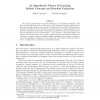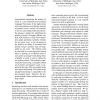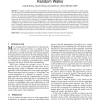1541 search results - page 17 / 309 » Analysis of Random Noise and Random Walk Algorithms |
FOCS
1999
IEEE
14 years 7 days ago
1999
IEEE
We study the phenomenon of cognitive learning from an algorithmic standpoint. How does the brain effectively learn concepts from a small number of examples despite the fact that e...
AOSD
2007
ACM
13 years 12 months ago
2007
ACM
Inspired by our past manual aspect mining experiences, this paper describes a random walk model to approximate how crosscutting concerns can be discovered in the absence of domain...
ACL
2010
13 years 6 months ago
2010
Automatically identifying the polarity of words is a very important task in Natural Language Processing. It has applications in text classification, text filtering, analysis of pr...
TVCG
2011
13 years 2 months ago
2011
—This paper considers the problem of interactively finding the cutting contour to extract components from an existing mesh. First, we propose a constrained random walks algorith...
EUROCOLT
1999
Springer
14 years 7 days ago
1999
Springer
Abstract. Recent works have shown the advantage of using Active Learning methods, such as the Query by Committee (QBC) algorithm, to various learning problems. This class of Algori...



